- Home
- John Bellairs
The Mansion in the Mist Page 2
The Mansion in the Mist Read online
Page 2
Emerson went in first, with the lamp held high in his hand, and the others followed him. The wavering smoky light showed that the room was empty.
Anthony felt sick. He put his hand to his forehead and closed his eyes. A fit of dizziness came over him, and he shook his head violently. "It... it really was there," he muttered weakly. "Honest, it was!"
Emerson eyed him skeptically. "Anthony, my boy," he said, "has it occurred to you that maybe you fell asleep and dreamed the whole thing?"
Anthony looked disgusted. "Come on, Mr. Eells! I know when I'm asleep and when I'm awake! I really did see this big wooden chest, and it was right here where we're standing. Honest!"
"Well, in that case," put in Miss Eells calmly, "we have a mystery on our hands. I believe you saw something, Anthony, and if Emerson here wasn't such a know-it-all he'd agree with me. To tell the truth, I've felt that there was something creepy about this house ever since I first set foot in it. Em, do you think we should go home?"
Emerson shook his head vigorously. "Absolutely not! In the first place, I want to find out what happened to those three people I rented this place to. And in the second place, I'm not going to be scared off by tales of disappearing chests. Besides I enjoy the fishing and the whole relaxing atmosphere of this island."
"Relaxing!" snorted Miss Eells. "We'll see how relaxing things will be if more strange things happen." But she knew there was not much point in arguing further with her stubborn brother, so she gave up and went downstairs to the living room with the others. Emerson banged out some ragtime on the piano while Anthony and Miss Eells played cards. After a short time they all got very drowsy and went off to bed, and Anthony fell asleep to the sound of water gurgling over stones outside his window.
Days passed, and nothing very exciting happened. Emerson found an old badminton set tucked away in a closet, and he set it up in the side yard. The three of them took turns playing one another, and they had a lot of fun. Anthony caught a few fish, but because they were small Emerson made him throw them back. Gradually everybody got used to life on the island, and for the most part they found it enjoyable and relaxing. Yet, the chest and the disappearing figure stayed on Anthony's mind—he couldn't quite get rid of them.
One still, muggy afternoon, while Emerson and Miss Eells were out fishing, Anthony began wandering about the house again. For the first time in days he was really beginning to feel bored. He poked into closets and found old croquet sets, bows and arrows, warped golf clubs, and one dead mouse. Then he went downstairs and decided to examine the small pantry that was next to the kitchen. On its dusty shelves he found old cloudy jars of preserves that probably weren't fit to eat, a tin pail that had once held Swift's lard, an inkwell, and an old wooden pen holder with a rusty metal nib. There was also a brown earthenware jug and an old meat grinder that was missing its handle. Anthony was about to leave when he noticed the glimmer of something white behind one of the jars of preserves. Reaching in, he pulled out a fan-shaped vase made of milky white china. Turning it upside down, he shook out a small white card. It was covered with dust, but when he had blown the dust away Anthony saw that there was writing on the card in copper-colored ink. It took him a while to figure out what the handwriting said, but finally it became clear:
The password: Auro est locus in quo conflatur. And the greatest clue of all is in the Temple of the Winds.
Anthony stared at the card. He hardly knew what to think. What could this mean? Password? Password for what? He didn't know Latin, so he didn't have the faintest idea what the mysterious phrase meant. And the second sentence was pure gibberish as far as he was concerned. Nevertheless, puzzles fascinated Anthony, and he took the card away with him. He would show it to Emerson and see if he could make anything out of it.
Later that afternoon, when Emerson and Miss Eells came back, Anthony showed them the card. Like Anthony, Emerson had trouble with the handwriting, but he figured it out eventually. With a little shrug and an odd smirk, he handed the card back to Anthony.
"It's as clear as mud!" sighed Emerson. "The Latin phrase is from the Book of Job in the Bible. It means: There is a place for gold where it is gathered together. Good news for prospectors, I suppose, but not very helpful to anyone else. As for the second phrase, I have to agree with you—it's utterly meaningless. At one time rich people owned vast estates, and they built little ornamental buildings on the grounds just to pretty things up. Sometimes the buildings had names like the Temple of the Winds. But we don't have anything like that here. You know what I think? Some people who were vacationing here long ago played charades at night, and these were two of the phrases that people had to act out. And when you consider the Latin phrase, they were probably a bunch of professors. I wouldn't spend any time mulling over that card if I were you, Anthony—you'll just be driving yourself buggy over nothing. It's not a clue to help you find a gold mine or anything like that. Tear it up and sleep well tonight!"
Anthony nodded politely to Emerson and stuck the crumpled card in his pocket. In his heart he was not convinced by Emerson's wonderful explanation, but he didn't feel like arguing.
The rest of the day was spent playing badminton and pinochle and arguing over baseball trivia. After the sun went down the three campers sat in rocking chairs on the front porch and watched the twilight deepen over Shadow Lake and the stars come out. An ominous silence spread over the water, and in the west a dark thunderhead was rising.
"I think a storm is coming on," said Emerson, as he puffed at his meerschaum pipe. "And I'll bet it's going to be a real gully washer."
"You're such a great weather forecaster," said Miss Eells. "You ought to be on television."
"Isn't she wonderful, Anthony?" Emerson chortled. "And to think I've had to put up with her for more than sixty years. It's a wonder I haven't turned into an ax murderer or a mad strangler."
"There's still time," muttered Miss Eells, and then she burst into a fit of giggles.
Throughout all this kidding Anthony sat in stony silence. He was thinking of the mysterious disappearing chest. What if it returned to the empty room tonight? He hoped that it wouldn't. He really didn't want to see the thing again, ever. The trouble was, he couldn't get the chest out of his mind—it was burning a hole in his brain. What was it for? Did the password have anything to do with it? Every time he asked himself these questions his head ached.
The stormy darkness on the lake deepened. A jagged streak of lightning split the sky, and thunder rumbled in the distance. A cold wind began to blow, and the three campers went inside for more pinochle. Miss Eells had baked some peanut butter cookies in the oven of the old iron cookstove, and they were delicious. Everybody guzzled ginger ale, talked a lot, argued over points, and had a good time. Finally the old shelf clock in the kitchen whanged eleven times, and everyone began to yawn.
"Well, I guess it's sleepy time," sighed Miss Eells, as she gathered the cards together and stacked them neatly in the middle of the table. "There's one thing, you know, that's good about roughing it in the wilderness: If a storm hits, it can't knock out your power, because there isn't any."
"You always see the bright side of things," sniffed Emerson. "Next year I am going to have a generator installed up here. It won't be picturesque, but at least we won't ruin our eyes trying to read by oil lamplight."
One by one, Emerson, Miss Eells, and Anthony made their way to the table at the foot of the stairs. On it were three candles in brass holders, and several small boxes of matches. Everyone lit a candle and plodded wearily off to bed. But when Anthony got to the door of his room, he felt wide awake and tense. He sat down on the edge of his bed and tried to calm his beating heart, but in spite of all his efforts he still felt as if he was ready to jump out of his skin. What was he so worked up about? And then it hit him: the password, the Latin phrase he had found in the old dusty vase. What was it for? He had an idea now, a strange and fascinating idea. When he knelt over the old wooden chest in the back room, he felt that the swirling mists hid
a doorway. A doorway to... to where? He had no idea where, but he did know that a password could unlock a door—at least, this is what the ancient tales said. All right then! What if...
Anthony shook his head to clear it of the dangerous ideas that were floating around inside. "I won't go into that room," he said through gritted teeth. "Besides, the chest is gone."
Wearily, Anthony stripped off his clothes and put on his pajamas. He yawned, blew out his candle, stretched, and threw himself into bed. But he lay there wide-eyed, listening to the rumbling of the storm that was getting closer. With a sudden jerk, Anthony hauled himself to his feet and fumbled for the matchbox on the window-sill. With trembling hands he tried to light the candle, but it took him three matches to do it. Then, with the candleholder gripped tightly in his fist, he padded out into the hall and moved stealthily toward the room that had once held the mysterious chest. The door was closed, and it took Anthony a long time to get up the courage to grip the knob. Finally he did, and with a sudden lunge he pushed the door inward. Then he gasped. By the trembling yellow light of the candle, he saw that the chest was there. Had it come because he wanted it to?
Slowly Anthony moved to the side of the chest and knelt down. He pushed the lid up and propped it open with the piece of wood that he had found on the win-dowsill. Holding the candle down inside the chest, he saw nothing but raw splintery wood. Gripping the edge of the chest with his hands, he stared and stared, but the chest did not change. Now, as he knelt there, Anthony began to feel the horrible urging that he had felt before: Climb in. Lie down. For a long time he resisted, while thunder rumbled outside and rain rattled on the window. Finally he clambered over the side of the huge chest and knelt on the bottom. From his shirt pocket he took the card he had found in the vase, and by candlelight he read aloud: "Auro est locus in quo conflatur."
At first nothing happened. Then, with a sudden rush of wind, the bottom dropped out of the chest, and Anthony fell downward into darkness.
CHAPTER FOUR
For a terrifying minute Anthony plummeted into the dark. Then his speed slowed and he was floating, until at last he landed gently on a hard surface. Blackness still surrounded him, so he had no idea where he was. Then he reached out and touched rough, splintery wood. He was still inside the chest! Reaching up he pushed at the lid, and with a groaning of rusty hinges it swung open. Anthony gasped—he was not in the dusty room any longer. The chest stood at the edge of a grove of enormous trees. Off to the right loomed a huge mansion of black stone. Gargoyles and other strange decorations sprouted from its clifflike sides. The windows were narrow and set deep into the walls, and thick tangles of bush and weed hid the foundations. The mansion was topped by a steep slate roof with round dormer windows set into it. Anthony could see tall shadowy chimneys capped by elaborate iron covers that reminded him of Chinese pagodas. Near the mansion was a large garden full of twisted weeds and vines, and statues stood here and there amid the growths. A strange shining wall of mist hung at the far end of the garden, and from it came the faint moonlight that lay over this odd nighttime world.
Fear gripped Anthony's heart. Where—on or off the earth—was he? One light burned in a second story window of the mansion, so maybe there was someone here who could help him. But the old house looked so gloomy and forbidding that Anthony was not in any hurry to meet the owner. Carefully he raised himself up and stepped over the side of the chest. The ground was covered by soft, springy beds of gray moss, and Anthony made no noise as he padded toward the mansion. Passing the edge of the garden, he heard a dry, rustling sound. He stopped dead in his tracks and stared toward a dark snarl of vines that were writhing and twisting like a mass of snakes. The vines lay still again, and for some reason Anthony felt very relieved. On he plodded, till he came to a winding flagstone path that led up to a low arched doorway set into the side of the house. But when he got nearer Anthony groaned in disappointment. The doorway was a fake! The elaborately carved arch was blocked by a heavy blank slab of stone.
For a long time Anthony stood there with his arms folded, staring at the false door. He glanced around and examined the leering monster faces and flowers that were carved on the veined marble. Next to the door stood a headless statue of a woman in a toga. She held a cup in one hand, and it was full of black dirt. Near her shoulder a gas bracket sprouted from the dark stone wall. Anthony knew about gas brackets—he had read about them in books. Before the electric light was invented, people's homes were lit by gas, the same kind of gas that is used in stoves and ovens today. In order to get the gas in the pipe to come on, you had to pull on a chain with a ring on the end and light the gas with a candle or a match. Sure enough, there was the chain dangling from the bronze neck of the bracket. What if I pull at it? thought Anthony. What do you think will happen? Anthony was deathly afraid of escaping gas, and every night before he went to bed he checked the burners on the range in his family's kitchen to make sure that everything was shut off. But out here in the open, gas might escape, and yet nothing bad would happen. Fumbling in his pocket, Anthony brought out a book of matches. He reached up past the shoulder of the statue and pulled at the ring on the end of the chain. Then he quickly opened the matchbook and ripped out a paper match, but he never got the chance to light it. With a deep grinding sound, the heavy stone slab swung inward, revealing a dark shadowy passageway.
Anthony was stunned. He stood staring with his mouth open in utter, total amazement. He had never seen a secret passageway, except in old movies on television. Well, here was one, waiting for him to enter it. But should he go in? As he stood pondering, a greenish flame popped out of the nozzle of the gas bracket and began to dance in the breeze, casting a faint flickering light. Anthony laughed—he didn't know why, but he did. And, for some reason, he felt less afraid. After taking a deep breath and clenching his fists, he plunged into the gaping blackness.
As he stumbled on, feeling his way cautiously, Anthony smelled raw wood, plaster, and dust. The passageway was narrow and wound on in total darkness until Anthony saw a thin shaft of light that fell across the carpeted path on which he was treading. He noticed that the light was coming from a little peephole that was about the size of a half-dollar. Bending over, Anthony peered through the hole and saw an elaborately furnished room. A thick red Oriental carpet lay on the floor, and fancy old-fashioned couches upholstered in red velvet stood near polished Victorian tables and marble busts perched on tall fluted columns. On the walls were dusky paintings in heavy gilt frames, and a strange hovering light filled the room, though Anthony could not figure out where it was coming from. A paneled door was set in the far wall, and at any minute Anthony expected someone to come through it, but no one did.
After peering through the peephole for a few minutes, Anthony moved on. The carpeted floor squeaked under his feet as he tiptoed along, and every noise seemed loud, but no one rushed in to grab him, so he kept going. After several twists and turns, the passage led past three or four more peepholes, but they also peered into empty rooms. On Anthony crept till he came to an opening that seemed a bit larger than the others. It was set very low in the wall, so he had to kneel down to see through it. What Anthony saw made him clamp his hand over his mouth so that his excited gasps would not attract the attention of the people in the room.
Through the tiny opening Anthony saw a strange and frightening scene. In a room that was as richly furnished as any of the others, a meeting was taking place. Grouped around a long polished table were twelve elderly men and women. They all wore black robes, and they looked like creatures from a bad dream. The faces of some of them were sagging and rubbery, as if they were wearing Halloween masks. Other faces were extremely wrinkled and pitted and had eyes that stared weirdly out of deep hollows. At the head of the table sat a tall, gaunt old man with arched black eyebrows. A long mane of white hair hung to his shoulders, and he wore half-moon glasses on his long, ridged nose. His red-rimmed eyes were cold and cruel, and he looked like some evil bird of prey. A jeweled gold sta
r shone on the black velvet robe—it looked like some important military medal from the past or the star of some secret order. Clearly this was the leader of the group, and he spoke in a harsh, grating voice as Anthony listened.
"...and so, my dear friends, we must find the Logos Cube. It is the key to the world we have built here, and without it this house and the garden outside and the forest and everything would dissolve into mist. It has got to be here somewhere, or we would not be alive. The traitor Nathaniel has hidden it, because he cannot possibly destroy it. And I have an odd feeling that it is very near us—under the floorboards of a room, perhaps, or in a cubbyhole in the attic. We must have it if we are to finish our grand design, our plan."
"But why not leave well enough alone?" wailed a small wizened old woman. "We are all here, and the mansion stands. Perhaps we should abandon our plan and settle for what we have."
The leader glared contemptuously at the woman. "That would be the cowardly way," he said, shaking his head. "No great work was ever done by people who just wanted to hang onto their little plot of ground. Besides, the Logos Cube needs to be controlled—by us. Even though we made it, there are many things about the cube that we do not understand. It has a life of its own, and that life goes on in some hiding place of this enchanted world. The other night, as I lay asleep, I felt the whole mansion tremble, from its chimneys to its foundations. Why did this happen? At another time I was walking along a hallway, and I noticed that a painting that hung on the wall had changed: It had been a landscape, but now it showed a stormy scene at sea. We are walking on brittle ice, my comrades."
"Do you mean that we are going to be destroyed?" quavered a very frail little man at the far end of the table.
"No," snapped the leader. "I do not think that is likely. But if our world here can change without our permission, then we are in trouble. It might change into something unrecognizable, some world where we would not be happy. That is one good reason why we have to locate the cube."

 The Curse of the Blue Figurine
The Curse of the Blue Figurine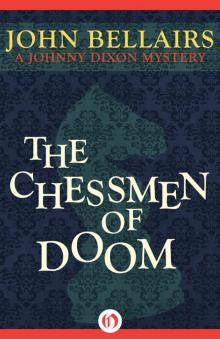 Chessmen of Doom
Chessmen of Doom Secret of the Underground Room
Secret of the Underground Room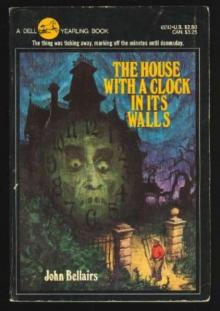 The House With a Clock in Its Walls
The House With a Clock in Its Walls The Vengeance of the Witch-Finder
The Vengeance of the Witch-Finder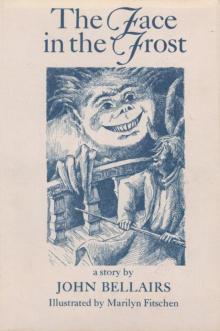 The Face in the Frost
The Face in the Frost Revenge of the Wizard's Ghost
Revenge of the Wizard's Ghost Spell of the Sorcerer's Skull
Spell of the Sorcerer's Skull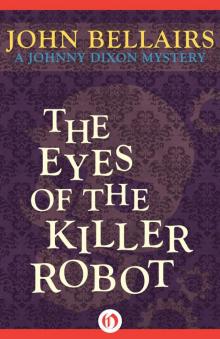 Eyes of the Killer Robot
Eyes of the Killer Robot Mummy, the Will, and the Crypt
Mummy, the Will, and the Crypt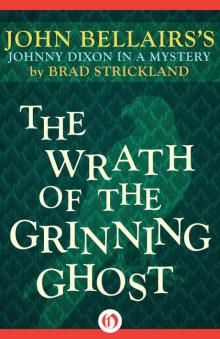 Wrath of the Grinning Ghost
Wrath of the Grinning Ghost The Mansion in the Mist
The Mansion in the Mist The Doom of the Haunted Opera
The Doom of the Haunted Opera The Bell, the Book, and the Spellbinder
The Bell, the Book, and the Spellbinder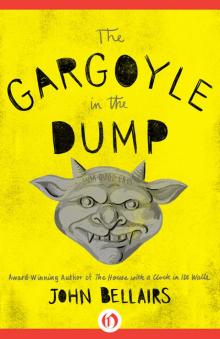 The Gargoyle in the Dump
The Gargoyle in the Dump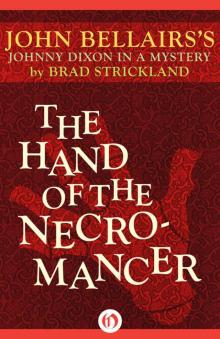 The Hand of the Necromancer
The Hand of the Necromancer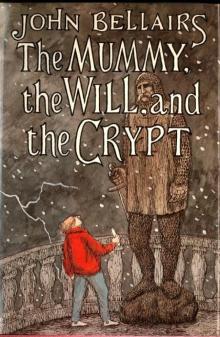 The Mummy, the Will, and the Crypt
The Mummy, the Will, and the Crypt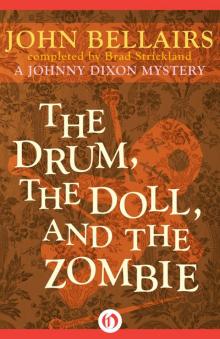 Drum, the Doll, and the Zombie
Drum, the Doll, and the Zombie The Specter from the Magician's Museum
The Specter from the Magician's Museum The Letter, the Witch, and the Ring
The Letter, the Witch, and the Ring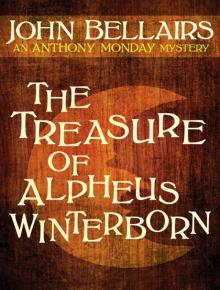 The Treasure of Alpheus Winterborn
The Treasure of Alpheus Winterborn The Dark Secret of Weatherend
The Dark Secret of Weatherend The Figure in the Shadows
The Figure in the Shadows